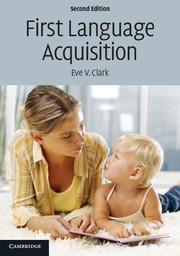Book contents
- Frontmatter
- Contents
- List of tables, boxes, and figures
- Acknowledgements
- 1 Acquiring language: Issues and questions
- Part I Getting started
- Part II Constructions and meanings
- Part III Using language
- 12 Honing conversational skills
- 13 Doing things with language
- 14 Two languages at a time
- Part IV Process in acquisition
- Glossary
- References
- Name index
- Subject index
14 - Two languages at a time
from Part III - Using language
- Frontmatter
- Contents
- List of tables, boxes, and figures
- Acknowledgements
- 1 Acquiring language: Issues and questions
- Part I Getting started
- Part II Constructions and meanings
- Part III Using language
- 12 Honing conversational skills
- 13 Doing things with language
- 14 Two languages at a time
- Part IV Process in acquisition
- Glossary
- References
- Name index
- Subject index
Summary
When children talk, like adults, they make use of the language of the community they are growing up in. But many communities make use of more than one language or more than one dialect. In these communities, children have to choose which language to speak whenever they talk. Their choices can depend on the family role, gender, status, power, and age of the interlocutor, as well as on the topic. It also depends on such factors as social class, since that in turn may affect decisions about when to use each language, and who to, in specific settings.
Choosing a language, just like choosing a speech style, reflects in part what the speaker shares as common ground with the addressee. How, then, does learning two languages – or two dialects – differ from learning just one? Growing up in a multilingual community results in the learning of not just one language, but two or more, either at the same time or within a few years of each other. What effect does exposure to more than one language have on the process and general course of acquisition? Are there differences in the road followed by bilingual versus monolingual children? In this chapter, the focus is on the social factors that affect choices of language and dialect. I first consider bilingualism in general, and then look at some of the social and cognitive issues for children learning two (or more) languages as they advance from babbling to words to constructions.
- Type
- Chapter
- Information
- First Language Acquisition , pp. 336 - 354Publisher: Cambridge University PressPrint publication year: 2009



